THE WRC NATIONAL COVID-19 WATER AND SANITATION SURVEILLANCE PROGRAMME
Still in the of throes of confronting the current global health crisis, international effort is centered around curbing the transmission and spread of the coronavirus. This virus has emerged at the top of the list in the May 2020 Global burden of disease study, surpassing Malaria when reviewing global deaths caused by viruses. For countries where mitigation interventions such as social distancing have been uplifted, a great concern exists regarding the re-emergence of the virus, intensifying focus on effective surveillance systems that will prepare countries for future waves of the infection.
The Water Research Commission (WRC) on 20 May 2020 launched a special programme on the Surveillance of COVID-19 in wastewater. Conceptualised as the implementation vehicle for monitoring the spread of COVID-19 in communities, the primary aim of this programme is; to share knowledge, stimulate research and innovations on water quality, sanitation and health and support the initiatives of government in curbing the spread of COVID-19.
The limitations in the capacity of the global health system and the pace at which the Coronavirus is spreading have intensified the need to broaden surveillance strategies and to look at a wide array of approaches at tackling this pandemic. For the virus to be effectively constrained, rapid action is critical, and preparedness measures must outpace the pace of transmission. This is an almost impossible feat for developing countries that may not be able to afford mass-screening programmes to identify new infections.
The Research Team: COVID-19 Surveillance Programme
The phase 2 project team: COVID-19 Surveillance Programme
Prof Stanley Liphadzi » Read more
Dr Shafick Adams » Read more
Mr Jay Bhagwan » Read more
Dr John Zvimba » Read more
Dr Nonhlanhla Kalebaila » Read more
Dr Eunice Ubomba-Jaswa » Read more
Dr Gina Pocock » Read more
Leanne Coetzee » Read more
Prof Maureen B Taylor » Read more
Dr Janet Mans » Read more
Bettina Genthe » Read more
Water treatment systems play a pivotal role in public health protection
Although the coronavirus is predominantly believed to affect the respiratory route, viral RNA has also been detected in the faeces of infected individuals of severe acute respiratory syndrome (SARS) and Middle East respiratory syndrome (MERS) infection. Global studies carried out on the coronavirus, postulate the high possibility of COVID-19 surviving in wastewater. Several research initiatives are being undertaken internationally to answer the same concern we all have regarding how long the virus can survive in the wastewater and sanitation environment and under what conditions.
If the virus does survive in wastewater and sanitation samples, understanding the level of risk posed to communities and implementing key strategies that involve an early warning alert of potential communal spread will be critical.
Water treatment systems play a pivotal role in public health protection and the analysis of wastewater treatment systems serve as an invaluable area of the study when investigating viral community infection and may be pivotal in the monitoring strategies used to curb environment transmissions. By continuously studying and monitoring the levels of the coronaviruses, it may be possible to determine the spread the COVID-19 infections.
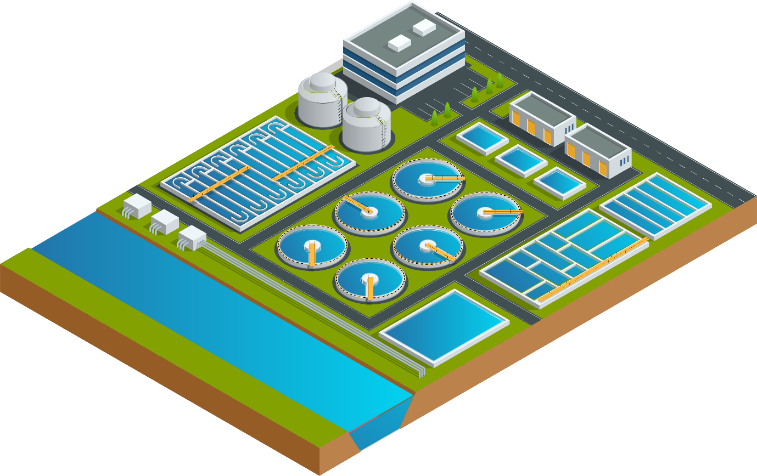
Reference: adapted from https://www.regina.ca
A different focus for the developing world
While the developed world’s focus is that of safety of water services personnel and using this virus as a marker to determine the prevalence and health of their residents, for a developing country like South Africa understanding the fate of the virus in water is of significance as many of our communities in rural, dense and informal settlements are highly vulnerable. Intermittent water supply, environments with limited or no drainage infrastructure as well as inadequate and improper non-Sewered sanitation systems places these communities at increased exposure to risk from the virus. The COVID-19 surveillance data from wastewater and sanitation systems could provide South Africa with the requisite knowledge on viral prevalence and infectivity to manage the risk effectively. It will also play a valuable role in monitoring the progress of the disease and the efficacy of the interventions as part of the long-term surveillance.
WRC National COVID-19 Water and Sanitation Surveillance Programme
Despite some advances made in the medical and research fields, there is still a lot we do not know about the virus. What we have witnessed however is that containment of the virus has proven to be difficult in some areas, especially densely populated areas. The need to identify hotspots and the early stages of the disease to curb transmission is imperative. By determining geographical risk areas for infection and more specifically investigating epidemiological characteristics of COVID-19 infections, secondary attack rates and modes of transmission, we could predict second wave infections and mitigate the virus societal and medical impact.
The WRC intervention is comprised of three phases, the first being the establishment of the proof of concept of presence of COVID-19 in wastewater and sanitation samples, as well as establishing sample collection and testing protocols so that monitoring results can be reliable and compared. The second phase focuses on the establishment of a wider capacity of laboratories in South Africa and puts into operation more communities into surveillance. The third phase will enable the facilitation of the establishment of a national surveillance programme supported by hotspot mapping.
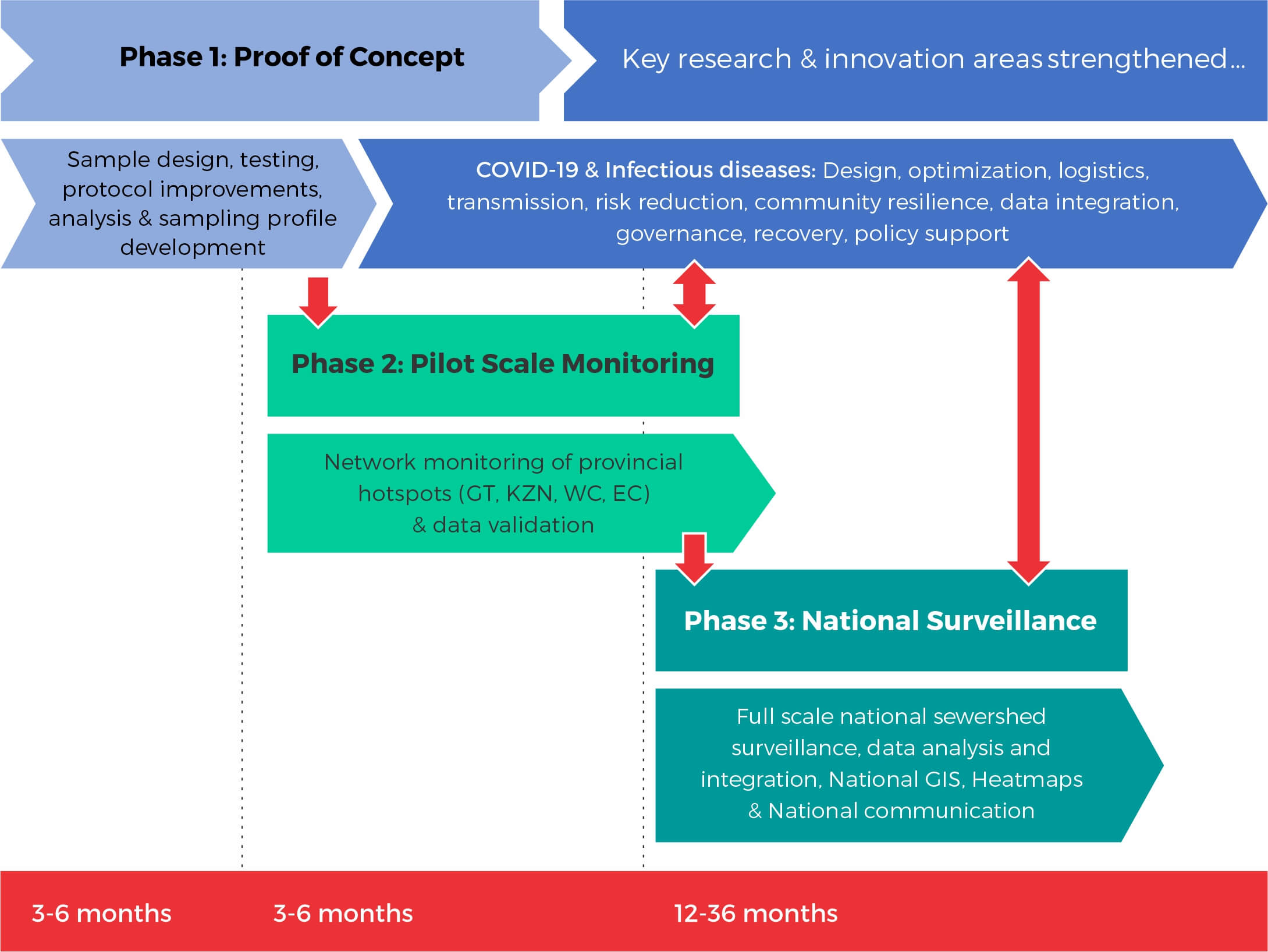
On the 1st of of May 2020 the first phase of the Covid-19 surveillance programme kicked off with the establishment of the proof of concept which saw the collaboration of WRC, Waterlab, CSIR and University of Pretoria (UP). The purpose of the programme was to establish the monitoring of Covid 19 infections in communities using a water and wastewater quality-based approach. This first phase of the three-phase programme approach of proof of concept was successfully completed in September 2020. The objectives undertaken in this first phase were to establish the scientific sampling and testing methodologies to determine the presence, persistence and infectivity of SARS-CoV-2 RNA fragments in wastewater influents especially around water environments in non-sewered informal settlements.
Phase 1 Updates
Water Wheel Article : July 2020
WRC NSS Covid-19 Surveillance Article - October 2020
WRC Infographic - Wastewater and Covid
Science Brief 1: COVID Progress
WRC Proof of Concept Study: Using wastewater and water quality surveillance to monitor the spread of Covid-19 in South African communities
The concept of screening municipal wastewater and environmental water quality as an epidemiological tool for viruses is not a new concept. Recent studies have shown that environmental surveillance of SARS-CoV-2 (the virus responsible for the Covid-19 disease) signals or biomarkers (typically RNA) can be a low-cost solution for tracking Covid-19 outbreaks in communities. Because of the need to validate sampling and analysis methods in the South African context, a proof of concept study has been commissioned by the Water Research Commission. This short-term study will help in facilitating the implementation of a nationwide initiative for the surveillance of Covid-19 spread in communities using a water and sanitation-focused approach as a means of supporting the current Covid-19 surveillance initiatives, and also to serve as an early warning for the resurgence of the virus and other waterborne disease outbreaks.
Science Brief 2: COVID Progress
WRC Proof of Concept Study: Wastewater-based epidemiology for surveillance of the spread of Covid-19 in South African communities
After a four-week period of wastewater sampling for the Covid-19 virus from ten wastewater treatment works serving hotspot areas in Metropolitan areas in five provinces, the Water Research Commission study has drawn the conclusion that SARS-CoV-2 was detected in 98% of wastewater samples collected. Results indicated an increase in the viral load in the samples being tested with time, which corresponded to the increase in case numbers in the hotspots as the peak infection phase of the pandemic was entered. This confirms and demonstrates the power of wastewater surveillance of the virus responsible for Covid-19, and has demonstrated the proof of concept. Continued sampling of these sites already involved will allow for the expansion of trend monitoring, and it is recommended that more wastewater treatment works be added to the sampling protocol so as to move to a pilot phase study.
Science Brief 3: COVID Progress
WRC Proof of Concept Study: Use of wastewater-based epidemiology for the surveillance of the spread of Covid-19 in non-sewered South African settlements
While wastewater-based surveillance resonates easily with sewered settlements, sampling and testing challenges exist in using the same approaches when areas are non-sewered. The lack of infrastructure and informality results in several dispersed sources of used and waste waters, causing complexities. A Water Research Commission funded research team explored a sampling approach focusing of sur¬face runoff on drainage paths in these settlements. Among others, results have shown proof of concept in terms of both virus RNA recovery and positive gene amplifica¬tion of SARS-CoV-2 in three river samples and one surface runoff sample from an informal settlement in Gauteng. All samples were positive for at least two gene targets of SARS-CoV-2. This study is the first of its kind in South Africa and possibly globally, and is of high value for developing countries where many communities are not connected to formal sewer networks, or where wastewater or sewage is allowed to discharge into water courses (streams, rivers, stormwater channels, wetlands, reser¬voirs etc.) untreated.
Science Brief 4: COVID Progress
WRC proof of concept study: Wastewater Surveillance of the SARS- COV-2 virus indicates the start of the third wave of infections.
Wastewater-based epidemiological (WBE) surveillance has proved to be a cost-effective means of providing an early warning system of the spread and increase of Covid 19 infections. A Water Research Commission funded research team, through WBE was able to detect an increase in infections in a community, through the sharp increase in the number of RNA copies in the wastewater samples tested, which showed the signals of the spike three weeks before clinical testing was able to confirm the similar trend. The increase in RNA signals also include the asymptomatic cases which play a significant role in the spread of infections.
Science Brief 5: COVID Progress
Monitoring for the third wave: detection and sequencing of SARSCoV-2 at sentinel wastewater treatment sites (National SARSCoV-2 Wastewater-based Epidemiology -Surveillance Initiative)*
The results from detection of SARS-CoV-2 trends from wastewater at sentinel sites in South Africa is showing its capabilities as an early warning mechanism as it can predict the increase in infection rates in communities served in the sewer catchments served, way ahead of the reported clinical cases. The surveillance results also demonstrate some concordance of qualitative results with clinical epidemiologic curves, and successful detection of mutations compatible with known circulating SARS-CoV-2 variants. This science brief reports on the latest achievements of the wastewater-based epidemiology programme of which the WRC is a partner.
Science Brief 6: COVID Progress
A longitudinal view and trends on the detection and sequencing of SARS-CoV-2 at sentinel wastewater treatment sites by the South African Collaborative COVID-19 Environmental Surveillance System (SACCESS) network, 2020-2021
Whilst Wastewater-based epidemiological (WBE) detection results have continuously shown the presence of SARS-CoV-2 in wastewater, this science brief shows how anomalies in our results were picked up during the third wave. Although this could mean that there is a sensitivity in our detection mechanism, however, this science brief shows how our data challenges network partners to supply meaningful and timely data to public health decision makers as our data has shown higher number of cases in sewage drainage than reported numbers.
Science Brief 7: COVID Progress
Understanding and unpacking the third wave of the SARS-CoV-2 infections through wastewater-based epidemiology at sentinel wastewater treatment sites
The testing and detection of SARS-CoV2 RNA in wasterwater has not only depicted how a large number of community members are asymptomatic but has further revealed that a large number of cases are so mild that the lab results may reflect less than 10% of the cases. This is as a result of the mild cases not seeking medical attention. This science brief will therefore look into how it is vital that frequent wastewater sampling occurs as it will possibly determine the effective reproductive rate of SARS-CoV-2 using Wastewater based epidemiological detection.
SCIENCE BRIEF 10: COVID PROGRESS
The efficacy of passive samplers for water quality based COVID 19 epidemiology surveillance
Wastewater-based surveillance of communities for SARS-CoV-2 viral prevalence by sampling from wastewater treatment works is a powerful complementary epidemiological tool. However, in South Africa almost 40% of the population is not connected to a waterborne sewerage system.Sampling and surveillance of grey water and faecal waste within our non-sewered areas may give an early warning of the presence of COVID-19 infections in these communities, where there is both the risk of rapid spread and low likelihood of conventional testing.Passive sampling of environmental sites has shown promise, and may overcome issues of low yield when viral load is low and during high dilution periods, particularly in rivers downstream of unsewered settlements. Passive samplers have the advantage of allowing for easier and cheaper transport of samples compared to grab samples that require the costly transport of large volumes of water maintenance of the cold chain out of rural areas. Sample processing is also much quicker compared to concentration of water samples. Inclusion of trend monitoring of SARS-CoV-2 prevalence in unsewered communities together with established Wastewater-based epidemiology (WBE) data collection from WWTW sampling can greatly expand the knowledge base and serve to highlight the needs of vulnerable communities in South Africa. These passive samplers can now also potentially be used for wastewater-based epidemiology for a broader scope of pathogens than only SARS-CoV-2.The success of passive samplers from this initiative has demonstrated the future potential and opportunity to enable more widespread environmental water quality monitoring due to its low cost and ease of application in the collection of samples.
In this phase a wider network for pilot scale testing will be implemented across pre-defined communities in South Africa. The ultimate objective being to determine whether the presence of SARS-CoV-2 in untreated wastewater can be used as an early warning indicator of COVID-19 infections in communities. This will be done through collecting raw sewage data from pre-defined sampling sites and cross linking this data with the number of infected people in that particular area as provided in public health data.
Diagram 2. Phase 2 – process
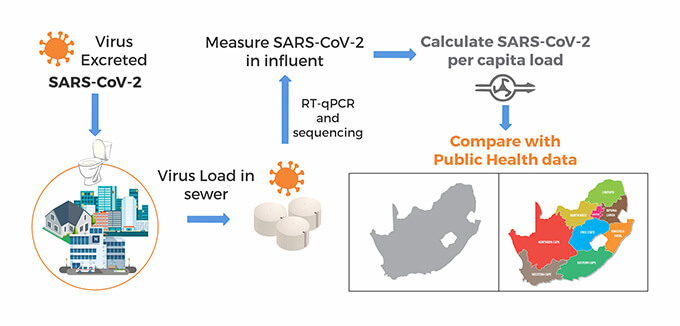
Four provincial hotspots have been outlined for pilot-scale testing and these are Kwa-Zulu Natal, Eastern Cape, Western Cape and Gauteng. The sampling and testing protocols along with the validated methodology will be applied by the pre-contracted collaborators to yield pilot monitoring data.
In this phase the WRC and its partners will coordinate the implementation of the national programme across pre-defined work packages.
Key outcomes of phase 3 are:
- COVID-19 Special public health surveillance
- Novel water and sanitation-based approach for surveillance of COVID-19 spread in less developed communities
- Near-real time tracking of COVID-19 spread and resurgence in communities
- SP143_Methodology summary_SARS-CoV-2 compendium_web
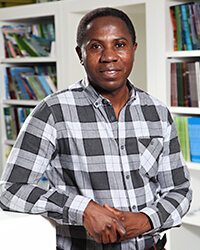
Dr. Stanley Liphadzi
Chairperson
Dr Stanley Liphadzi is the Group Executive Manager of Research & Development at the Water Research Commission (WRC) of South Africa. He is also an Adjunct Professor at the University of Venda. Dr Liphadzi holds a PhD in Biological Engineering from Kansas State University, an MSc (Agronomy) from the University of Pretoria, and a Master of Business Leadership (MBL) from the University of South Africa. He has previously worked as a University Lecturer, Development Manager, Research Manager, and Executive Manager. Dr Liphadzi has authored/co-authored over 27 peer reviewed publications. He has also served on the boards of various organisations, including the Sci-Bono Discovery Centre and the South Africa National Biodiversity Institute (SANBI). Among other honours, Dr Liphadzi is a Fulbright Scholar.

Dr. Shafick Adams
Data & Information
Dr Shafick Adams is the Executive Manager responsible for the Water Resources and Ecosystems key strategic area at the Water Research Commission. He also functions as a Research Manager, managing research projects related to groundwater, data tools and water resources protection. He holds a PhD and MSc (cum laude) from the University of the Western Cape where he lectured prior to his appointment to the Water Research Commission. Dr Adams is the past chair of the Groundwater Division of the Geological Society of South Africa and co-chair of the International Water Association’s Groundwater Restoration and Management Specialist Group. He is a registered Natural Scientist with SACNASP and a Fellow of the Geological Society of South Africa. He holds positions on various strategic committees, task teams and advisory panels. Some of his personal research interests are in water supply diversification and smart tools for water resources management. His passion is human capacity development through research, professional bodies and individual mentorships.
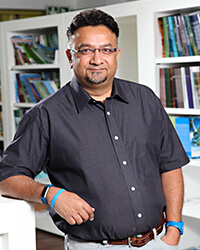
Mr. Jay Bhagwan
Technical Support and Coordination
Jay Bhagwan is the Executive Manager of key strategic area of Water Use and Waste Management at the South African Water Research Commission, which focuses on the management of water and wastewater in the domestic, mining and industrial sectors. He has been instrumental in establishing a robust portfolio of research projects and innovations related to water supply and wastewater management. Mr Bhagwan holds a Masters Degree in Tropical Public Health Engineering from Leeds University, UK and a GDE in Municipal Engineering from WITS University. With his knowledge and experience in the implementation of water and sanitation projects, he has played and participated in the shaping of national water policy and legislation. He has served as the President of the Water Institute of Southern Africa, Chairperson of the Minister of Water Affairs and Forestry Water Advisory Committee, as well as several international advisory positions. Currently Mr Bhagwan is a Board member of the FSMA, Chair of the IWA NSS Specialist Group, and a Committee member of Coalition Against Typhoid. He continues to be actively involved in broad range of areas in the field of water supply, wastewater and sanitation.
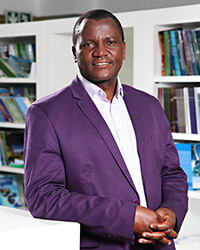
Dr. John Zvimba
Technical Support
Dr John Ngoni Zvimba is currently a Research Manager responsible for the sustainable integrated wastewater resource futures research portfolio at the Water Research Commission of South Africa. Prior to joining the WRC, Dr Zvimba was a Technical Specialist at Mintek and later became a Senior Researcher at the Council for Scientific and Industrial Research (CSIR). He has over 20 years of research experience, focusing on sustainable municipal, industrial and mining wastewater treatment and management. His experience covers research and development on technology and innovation for treatment, volarisation beneficiation of wastewater streams and sludges. He holds a PhD in Chemistry and has postdoctoral research experience in bioprocess engineering. Dr Zvimba has authored/co-authored over 20 peer reviewed publications, 1 book, 2 patents, several conference presentations, technical reports, and supervised/co-supervised postgraduate students (4 MSc and 1 PhD). He is currently a member of the Water Institute of Southern Africa and the International Water Association.
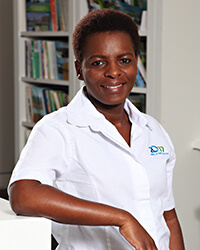
Dr. Nonhlanhla Kalebaila
Technical Support
Dr Nonhlanhla Kalebaila is a Research Manager at the Water Research Commission, leading and managing a portfolio of research on domestic water supply, drinking water treatment and water quality. Dr Kalebaila holds a PhD in Chemical Technology, specialising in water utilisation. Her areas of expertise lie around integrated water resources management, water treatment technology and quality, environmental science and awareness, waste management and resource recovery. Amidst the course of her professional career, she has also worked in the fields of environmental science, applied science, biochemistry, microbiology and nuclear technology. She has authored and co-authored several peer reviewed research papers, including original research papers, a book chapter and conference articles.

Dr. Eunice Ubomba-Jaswa
Technical Support
Dr Eunice Ubomba-Jaswa holds a PhD in Microbiology from the Royal College of Surgeons in Ireland (RCSI) and an MSc in Medical Microbiology from the London School of Hygiene and Tropical Medicine (LSHTM). Her areas of expertise lie in microbiological water quality and how it ultimately affects public health. Dr Ubomba-Jaswa is currently a Research Manager: Water Resources Quality at the Water Research Commission (WRC) in South Africa where she manages a portfolio of projects that deal with the thematic areas of water pollution and human health, emerging contaminants (microbial and chemical), removal of contaminants as well as source water protection.

Dr. Gina Pocock
Waterlab (Pty) Ltd
Gina holds a PhD degree in Microbiology and a BSc Honours degree in Applied Science (Water Utilisation Engineering). She is a water treatment and water quality specialist with 13 years’ experience working in the South African water industry. She is passionate about the research and development of innovative and sustainable water treatment technologies and their successful implementation through the innovation chain. in the development of water treatment processes and products, which includes treatment processes for mine and industry impacted water. Gina has conducted numerous assessments of wastewater and water treatment plants as well as water quality monitoring and compliance assessments, river health studies, technology due diligence reviews, water supply feasibility studies and climate change resilience planning. She has been the principle researcher and project leader on numerous Water Research Commission (WRC) funded projects, serves as an independent reviewer of proposals for the WRC and has sat on various project reference committees.
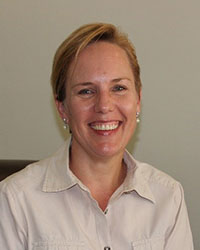
Leanne Coetzee
Waterlab (Pty) Ltd
Leanne is a water treatment and water quality management and monitoring specialist with 21 years of experience in the water sector. She has a Master’s degree in Microbiology and is a Professional Natural Scientist. She enjoys the optimisation and improvement of water and wastewater treatment works, including the visualisation and interpretation of information from routine operation and compliance data and process audits. She enjoys training of laboratory and process staff to understand operational information and processes and has a keen interest in research and management of eutrophic waters, water treatment, wastewater epidemiology and river health. As part of her portfolio she is involved in ISO Water Quality Technical Committee and is also involved in South African Standard Development Water Quality Technical Committee, which develops the drinking water standard. Leanne was also a lead assessor in the Blue and Green Drop Certification Program.

Prof. Maureen B Taylor
University of Pretoria
Prof Taylor read for the degrees of BSc (Zoology & Microbiology)(1971), BSc (Hons) (Microbiology)(1972) and MSc (Microbiology)(1975) at Rhodes University, Grahamstown. She then worked as a Research Officer, specialising in the bacteriology of meat and meat products, and later yeast taxonomy, at the Food Research Institute, CSIR. In November 1980 she joined the Virology Section of the Department of Medical Microbiology, later the Department of Medical Virology, University of Pretoria as a Professional Officer. Here she obtained her DSc (Microbiology)(1985), specialising in the propagation and detection of hepatitis A virus. In 1987 she was appointed as a senior lecturer in the Department, with promotion to Associate Professor (Ad hominem) in 2000, and Professor (Ad hominem) in 2013. From June 2013 – June 2018 she held the position of Rand Water Chair in Public Health where her research focused on the prevalence, detection, characterisation and molecular epidemiology of enteric viruses, especially those that are potentially food- and waterborne. In her position as Chair she also addressed the potential risks posed by biological and chemical contaminants in water to public health. Prof Taylor, now Professor Emeritus and retired, is the author or co-author of over 80 publications and. she has been invited to examine the MSc dissertations and PhD theses from a number of national and international tertiary institutions.

Dr. Janet Mans
University of Pretoria
Dr Janet Mans obtained her BSc, BSc (Hons) and MSc degrees in Biochemistry (University of Pretoria, South Africa). From 1999 she worked on fowl pox-based Newcastle disease virus vaccines at the Onderstepoort Veterinary Institute (South Africa). In 2004 she joined the Laboratory of Immunology (National Institute of Allergy and Infectious Diseases, NIH, USA) as a predoctoral fellow in the Molecular Biology Section under the supervision of Dr David Margulies. She obtained her PhD, on the structure and function of mouse cytomegalovirus MHC-I homologs, in 2008 (Wits University, South Africa). Since 2008 she worked on noroviruses, first as postdoctoral fellow in the Enteric Virus and Environmental Virology Group at the Department of Medical Virology, University of Pretoria, where she was appointed as Senior Lecturer in 2014. Her research combines norovirus surveillance in the clinical setting and the environment to understand the molecular epidemiology and diversity of these viruses in South Africa.
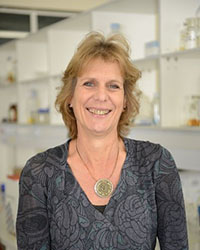
Bettina Genthe
CSIR Stellenbosch
Bettina has an MSc in Microbiology and is a Senior Researcher at the CSIR. She has over 35 years’ experience in the field of environmental health aspects and water quality and more than 25 years’ experience in health risk assessments. Her key areas of expertise include: health risk assessment, water quality, microbiology, and molecular biology. She has lead research on water quality and health since 1988, focussing on water quality issues. She has been a temporary advisor to World Health Organisation (WHO) and United States Environmental Protection Agency (US EPA) on Exposure Assessment. Bettina has extensive experience in water-related human health risk assessments, water quality monitoring (sampling and analyses), risk communication, health interventions, health and hygiene awareness creation and education.
Media Links
NEWS ARTICLE | 24 MAY 2021
How waste water is helping South Africa fight Covid-19Detecting the coronavirus in samples from treatment plants could give early warning of outbreaks and new variants. Read more >> |
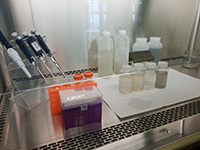 |
NEWS ARTICLE | 05 MAY 2020 WRC kicks off wastewater surveillance programme for Covid-19 spreadThe Water Research Commission (WRC) has launched a National Programme on Monitoring Covid-19 Spread in Communities to track the prevalence of the virus in communities through wastewater surveillance and monitoring. Read more >> |
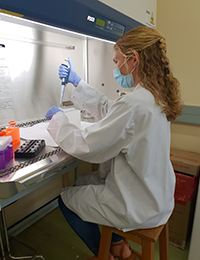 |
NEWS ARTICLE | 21 MAY 2020 SA sewage is now being checked to track Covid-19 hotspots
|
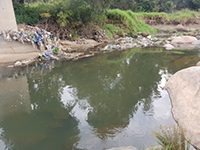 |
YOUTUBE VIDEO | 20 MAY 2020 The Water Research Commission is to monitor waste water, to track the prevalence of the coronavirus
|
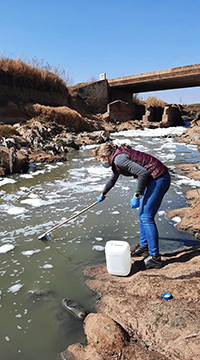 |
NEWS ARTICLE | 10 AUGUST 2020 Sewage can help scientists track Covid-19It’s long been used to track infectious diseases such as polio, hepatitis A and the norovirus, and for monitoring drugs and chemical contaminants that could affect human health. And now it’s a new low-cost ally in the fight against Covid-19: sewage. Scientists from the Water Research Commission (WRC), working with the Waterlab at the University of Pretoria and the CSIR, have already detected Covid-19 RNA signals from several wastewater plants in hot spots in Ekurhuleni, Tshwane and KwaZulu-Natal. Their results from their proof of concept study using wastewater and water quality surveillance to monitor the spread of Covid in communities shows an increase in the viral load in the samples being tested with time. Read more >> |
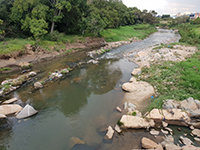 |
NEWS ARTICLE | 30 JULY 2020 Speculation: Impact on WASH as flow of funding divertedExperts came together to discuss tackling misinformation, building resilience to meet the current demand from water utilities, and developing much-needed aid towards the water, sanitation, and health (WASH) sector, which will be affected by the COVID-19 response. Read more >> |
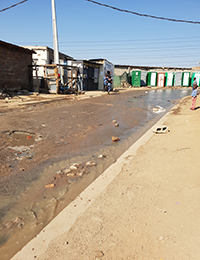 |
NEWS ARTICLE | 14 JULY 2020 SA may need Covid-19 wastewater, water quality surveillance programmeWith the escalation in Covid-19 infections in the country and the challenges associated with individual testing, the importance of introducing a nationwide wastewater surveillance programme becomes more immediate and relevant to complement national interventions. This could offer a cost-effective method of understanding the pandemic trends, provide an early warning system, identify hotspots and track the waves of the transmission as the pandemic unfolds. To date, the wastewater-based epidemiology approach has been successfully piloted in developed countries where there is wide coverage of waterborne sanitation, such as the Netherlands, United States of America, etc. Read more >> |
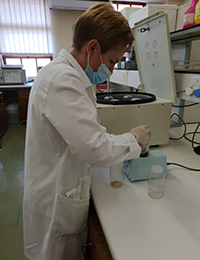 |
NEWS ARTICLE | 3 NOVEMBER 2020 WRC moves wastewater surveillance programme into pilot phaseThe Water Research Commission’s (WRC’s) emerging national wastewater surveillance programme has reached a milestone as it moves from the first phase proof-of-concept into a “catalysing” pilot phase. The WRC launched the first stage towards the development of a national wastewater surveillance programme in May to track the prevalence of the virus in communities through wastewater surveillance and monitoring. The tracing of the Covid-19 spread in sewered wastewater treatment systems and non-sewered sanitation systems provides information that could track and trace and signal hotspots of community transmissions in developing regions. Read more >> |
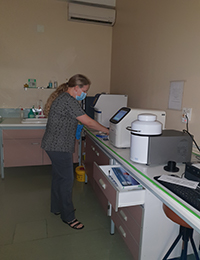 |
YOUTUBE VIDEO | 6 NOVEMBER 2020 Jay Bhagwan eNCA InterviewExecutive Manager, Jay Bhagwan, spoke to eNCA on the latest regarding the Covid-19 waste water survelliance programme. Watch video >> |
Key Contacts
Dr Mamohloding Tlhagale – Stakeholder Engagement and Partnerships
Dr Chantal Ramcharan–Kotze – Business Development and Strategic Partnerships
Ms Nomakhosazana “Khosi” Jonas – Marketing and Communications
Dr Valerie Naidoo – Business Development and Innovations
Ms Boitumelo Lekalakala – General Enquiries